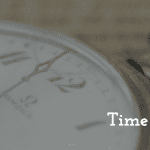 I’ll get right to the point.
I’ll get right to the point.
You don’t have time to read this. You’re important and you’ve got pressing things to do. Chances are if you’ve taking time to read this, you’re also doing something else at the same time. (95% of people in a recent TV Guide survey admitted to using their smart phone in the bathroom).
The average person on this blog stays here for just over a minute, long enough to skim the gist of something and then they hop off to more pressing things.
And I get it. The world moves quickly these days. We’re all connected to the rest of the world, and we’ve got lots of plates spinning. With each new technological advancement the world seems to get faster, and with every “improvement” there are people who see problems.
For example, did you know that when the Telegraph first appeared no less than the New York Times decried it as “Too fast for the truth” People were longing for the “good old days” when the mail only came twice a month by boat.
When the telephone came along people said that there was nothing wrong with it, except for the fact that it was ruining everyone’s manners.
Every time there is a new invention, there are people who have problems with it. So this isn’t going to be a blog about our technology outpacing our souls, those have been written, and most of us don’t have time to read them.
This is a blog about why we think that kind of technology will lead us to a better life, even though study after study has been written that the multi-tasking, always-late, constant-hurry, life leads us not to joy but despair.
Why do we live the life that leads us away from happiness?
Last year, I stumbled onto a gem of a book called “In Praise of Slowness” by Carl Honore. Honore isn’t writing a book for a Christian audience, he’s writing as a fast paced person to a fast paced society. And as a secular writer to a secular age here’s what Honore says our problem is:
The problem is that our love of speed, our obsession with doing more and more in less and less time, has gone too far; it has turned into an addiction, a kind of idolatry.
Idolatry is an incredibly religious word, it’s a Christian word, and it was a little jarring to read it in Honore’s book because he’s not writing from the perspective but he is incredibly honed in on on his description.
Idolatry from the Christian perspective is something that promises life and leads to death. It begins offering you everything and promises to take nothing, but slowly, over time, it takes everything and leads you with nothing.
This may sound like an overstatement, we are busy because we worship idols, but consider how you talk about your time.
When people ask you how you are, when was the last time you answered with something beside “busy”?
These days “I’m busy” is code for “I’m important” and we are all (pastors are often the worst) so busy being important that we forget how unimportant we really are.
The worst sin in Christian tradition is pride, and buried underneath our relationship to our schedule I think is often a kind of Hubris, a chasing after the wind, or at least trying to out run death.
But idolatry never leads away from death, it leads to it.
And to illustrate this huge claim that our relationship with our time is idolatrous, Honore opens up his book with a striking story.
For a chilling vision of where this behavior leads, look no further than Japan, where the locals have a word—karoshi—that means “death by overwork.” One of the most famous victims of karoshi was Kamei Shuji, a high-flying broker who routinely put in ninety-hour weeks during the Japanese stock market boom in the late 1980s. His company trumpeted his superhuman stamina in newsletters and training booklets, turning him into the gold standard to which all employees should aspire. In a rare break from Japanese protocol, Shuji was asked to coach senior colleagues in the art of salesmanship, which piled extra stress onto his pinstriped shoulders. When Japan’s stock bubble burst in 1989, Shuji worked even longer hours to pick up the slack. In 1990, he died suddenly of a heart attack.He was twenty-six.
Compare Shuji’s life to someone like the poet farmer Wendell Berry, or the Amish people who I’ll write about next week.
Which life do you think is better or happier? And why do we have such a pull toward the one and not the other?
Consider the advertisements that you are going to watch this week, what kind of life do they assume or even promote? Many of them are peddling products that are always promising to save you time, and improve your life.
But probably none of them are owned by Wendell Berry.













